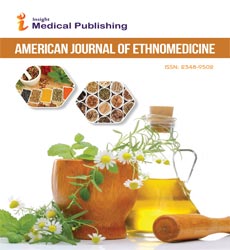ISSN : 2348-9502
American Journal of Ethnomedicine
Importance of Herbal Medicine
Janet Amaral*
Department of Pharmacognosy, RJK University, Illinois, United States
- *Corresponding Author:
- Janet Amaral
Department of Pharmacognosy, RJK University, Illinois, United States
Tel: 5569789630
E-mail: amaraljanet@lim.edu
Received Date: December 06, 2021; Accepted Date: December 20, 2021; Published Date: December 28,2021
Citation: Amaral J (2021) Importance of Herbal Medicine J Ethnomed Vol: 8 No: 10.
Description
The term "Traditional" refers to how herbal medicines have been used in the past, which applies to many of the items marketed as "Traditional Herbal Remedies." Traditional natural medicines and medicinal plant banks are used by a considerable portion of the people in many underdeveloped nations to address their healthcare needs. Despite the fact that modern medicine may coexist with this ancient technique, herbal therapy has remained popular for centuries due to historical and cultural factors. Such items are widely available in the marketplace, particularly in developed countries. Ingredients are sometimes sold for uses that have never been explored in typical treatment systems in today's world. Although some countries have rigorous production requirements for herbal medications, this is not the case everywhere. In Germany, for example, herbal medicines marketed as "herbal products" are identical to pharmaceutical products in terms of efficacy, safety, and quality.
In the United States, however, most herbal products are sold and regulated as dietary supplements, and these items do not require pre-approval based on any of these criteria. Herbal products have been incorporated into so-called "alternative," "supplemented," "holistic," or "comprehensive" products' medical systems, especially in Europe and North America, where herbal products have been incorporated into so-called "alternative," "supplemented," "holistic," or "comprehensive" products' medical systems. Traditional therapeutic methods (including the use of herbal remedies) were increasingly popular in the second half of the twentieth century, owing to a growing interest in self-sufficiency, particularly in the United States.
Consumer Reports has a favourable view of these products, owing to the fact that they are "natural" rather than "synthetic" in origin; they feel that such products are safer than pharmaceuticals and will be used for healthy living. It's a step in the right direction, and it can help you avoid unneeded exposure to "Western medicine." Although centuries of use in a traditional setting can be used to prove that particular herbal substances are efficient or safe, there are various considerations to consider when introducing these ingredients into modern practice. One issue is that in industrialized countries, components that were originally utilized for symptomatic treatment are now used as part of health promotion or disease prevention initiatives, so acute therapy has been replaced with chronic exposure. This means that comments regarding how products are now utilized that are based on "millennial proof of product safety" may be invalid. This does not necessarily imply that the product contains a component. This does not necessarily imply that a substance is harmful; rather, it implies that in today's world, safety cannot be assumed. The second issue is that modern scientific research rarely proves efficacy and effectiveness. Evidence-based methods on this topic have just lately been deployed, and the results suggest that there are still big information gaps to be addressed before you can be convinced of their usefulness for most herbal products. Customizing recipes that involve numerous herbs and other substances is one of the most difficult difficulties in transferring ancient herbal methods into traditional "Western" treatment. There is little incentive to standardize products when the purpose is to deliver personalised formulas.
Standardization means understanding growth conditions, harvest timing, extraction type, and other material processing for small farmers or traditionally educated herbalists in order to give people with trustworthy active ingredients. Standardization refers to the use of so-called good manufacturing practices for industrial production under specified conditions, similar to the manufacturing practises used in the production of pharmaceuticals, by a large number of manufacturers or distributors selling in supermarkets or health food stores.
Open Access Journals
- Aquaculture & Veterinary Science
- Chemistry & Chemical Sciences
- Clinical Sciences
- Engineering
- General Science
- Genetics & Molecular Biology
- Health Care & Nursing
- Immunology & Microbiology
- Materials Science
- Mathematics & Physics
- Medical Sciences
- Neurology & Psychiatry
- Oncology & Cancer Science
- Pharmaceutical Sciences
